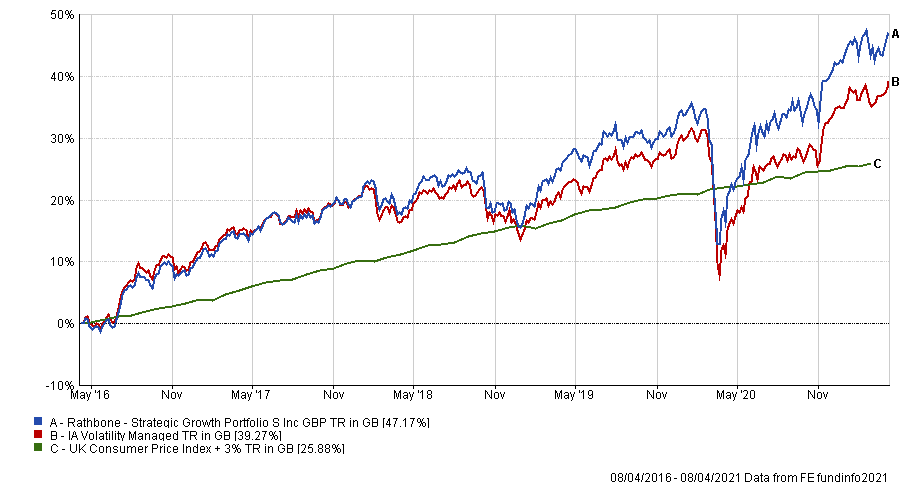Despite signs of potentially worrying market exuberance, Rathbone’s David Coombs is sticking to quality equity portfolios with strong cash flows and no low-quality debt.
Rathbones head of multi-asset investments David Coombs believes the collapses of Archegos Capital Management and Greensill Capital could be the "canaries in a coal mine’ for danger looming financial markets.
In a reference to the canaries that warned mining workers in the tunnels of dangerous gases by dying first allowing the miners to act, Coombs said that the recent financial scandals could be a similar sign for caution.
He said: “I have worked in finance for 37 years, giving me invaluable perspective: I have witnessed much exuberance and crises in markets over that period. The heroes and villains come and go, but the storylines and the plot-twists tend to get recycled.
“Fund managers, celebrity investors and CEOs are built up as gurus, then often derided as they fall from grace or just disappoint us. Some are bombastic incompetents who get out of their depth, others are plain vanilla criminals.”
The blow up of New York-based Archegos Capital Management is one most recent example. After its overleveraged equity bets went wrong, banks who financed the trades had to scramble for liquidity and create a jaw-dropping £20bn sell-off in certain stocks.
Some of the world’s biggest banks like Goldman Sachs, Morgan Stanley, Deutsche Bank, Credit Suisse and Nomura Holdings all bought up Viacom CBS shares on behalf of Archegos before the price started to fall and prompted a liquidity-driven fire sale in the stock.
Share price of Viacom CBS year-to-date
Source: Google Finance
In the UK, Coombs highlighted the fallout from Greensill Capital, a supply-chain financier that started lending on non-existent supply chains until its own loans got called in.
Coombs said: “Several investment banks and brokerages were caught up financing both – Greensill had even bundled up its ‘loans’ and sold them to specialist investment funds. Ouch.”
Just weeks before its collapse, founder Lex Greensill boasted of the company’s “enormous” liquidity to its staff.
Bill Hwang - the man behind the Archegos bets – in 2013 had to pay $44m to the US Securities and Exchange Commission to settle insider trading allegations.
Looking back at 2020, Coombs highlighted Luckin Coffee - which fabricated hundreds of millions of dollars in sales ahead of its initial public offering - and German fintech darling Wirecard - which collapsed after admitting that €1.9bn in cash was missing.
“Meanwhile, just last week two retail more retail investment funds were suspended because they had significant investments locked into illiquid debt securitisation funds,” he added.
The question of whether these are isolated cases, or if there is in fact a pattern emerging.
Coombs asked: “Is Archegos a repeat of Long Term Capital Management, the too-big-to-fail hedge fund of 1998 infamy?
“Is Greensill a repeat of subprime mortgages – shaky assets dressed up as high-quality loans?
“Is Deliveroo (a meal-subsidisation service in pursuit of a profit) a repeat of dot.com exuberance?”
In Coombs view, these could be past mistakes repeating themselves.
“These days, markets are awash with cheap money. Companies can tap cheap capital from bond markets and from stock markets,” he said.
“Banks seem to be slim on investment options – or in razor-sharp competition with each other – going off the deals revealed at Archegos and Greensill.”
He said investors should watch whether investment banks start to review their lending criteria or withdraw leverage across the board because of the recent scandals.
“Prime broking activities in particular do worry me, as they can result in large share price volatility if large positions are unwound rapidly,” he added.
However, he admitted that whilst it could be “bumpy”, such slumps should create opportunities instead of systemic risk.
He believes that the events at Greensill Capital shows investors should instead be wary of ‘shadow’ financing (credit extended by non-banks) and the investments that participate in it.
Indeed, according to the Financial Stability Board, almost half of global finance is now extended by non-bank institutions such as money market funds, hedge funds and other providers of finance.
“It’s hard to see more monetary easing from here, so the risk of some of the racier vehicles crashing as borrowing costs rise in the coming years does seem to be moving higher,” Coombs said.
In his view, “it’s time to be cautious, not fearful”.
He said: “The companies that dominate indices today are – in the main – more profitable and better capitalised than during the dot.com crash. Back in 1999, the risks for stocks were right there in the spotlight: poor-quality companies at huge valuations.
“These days the risks are hiding in the shadows, in the lightly regulated vehicles that supply a growing amount of financing to businesses and households.
“That’s why we’re maintaining quality equity portfolios with strong cash flows and no low-quality debt.”
He finished: “It’s possible to accuse me of being too old and too cautious, that the scars of past crises have taken their toll. That might be right.
“It might be that the canaries are singing and the most important thing I have learnt is to listen.”
David Coombs manages the £1.1bn Rathbone Strategic Growth portfolio, which has delivered a total return of 47.17 per cent over the last five years, compared to 39.27 per cent from the average fund in the IA Volatility Managed sector and 25.88 per cent from its CPI plus 3 per cent benchmark.
Performance of fund over 5yrs

Source: FE Analytics
The FE fundinfo five crown rated fund has an ongoing charges figure (OCF) of 0.62 per cent and a yield of 1.22 per cent.






